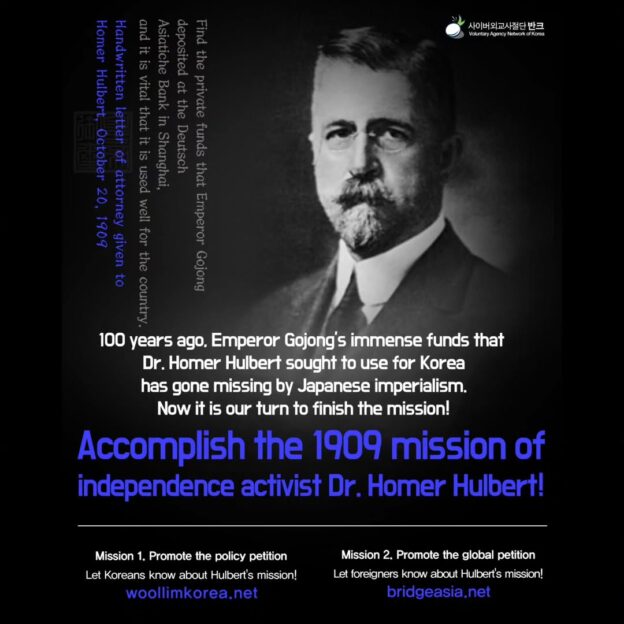
VANK has launched a global campaign to raise awareness of the private funds (Naetanggeum) of Emperor Gojong, which Dr. Homer Hulbert, a foreign independence activist, sought to recover. The initiative aims to initiate an official investigation into the missing funds.
Dr. Homer Hulbert was a key foreign independence activist who served as Emperor Gojong’s diplomatic advisor and secret envoy. He played a significant role in exposing Japan’s atrocities on the world stage by participating in the 1907 Hague Peace Conference and contributed to promoting Korea by writing about the excellence of Hangul and the Korean language in The New York Tribune.
Following his participation in the Hague mission, Hulbert faced persecution from Japan and was forced to relocate to the United States. However, when he briefly returned to Korea in 1909, he was entrusted with a final secret mission from Emperor Gojong: to retrieve the funds the emperor had deposited in the German-run Deokhwa Bank in Shanghai and use them for the benefit of the nation.
Naetanggeum refers to the personal financial assets of the royal family, kept in a treasury similar to a modern-day safe deposit system. In 1903 and 1904, Emperor Gojong deposited gold bullion and yen in the Shanghai-based Deokhwa Bank through the mediation of the German legation in Seoul. At the time, the bank manager issued a receipt stating that the funds could only be withdrawn under the emperor’s direct orders.
However, under constant surveillance by Japan, Emperor Gojong was unable to retrieve the funds himself. He therefore entrusted Hulbert with power of attorney and relevant documents, instructing him to reclaim the deposits and use them for the nation’s cause. Hulbert, acting in secrecy, took these documents to Shanghai, intending to use the funds to support independence fighters and aid struggling Koreans in Mexico.
Upon his arrival, however, he discovered that the funds had already been handed over to Japan a year prior. In 1907, suspecting that Emperor Gojong had used his secret funds to finance the Hague mission, Japan conducted an investigation and learned of the deposits. The Japanese authorities then forged official correspondence claiming to withdraw the funds on behalf of the emperor.
In April 1908, the Japanese Resident-General’s Office sent a letter to the German consul, stating that they had obtained a withdrawal request bearing Emperor Gojong’s official seal and demanding the transfer of the funds to Japan. Without verifying the request with Emperor Gojong, Deokhwa Bank complied, transferring the funds to Japan in two separate transactions based solely on the falsified documents.
The private funds that Hulbert sought to recover were crucial resources intended to support Korea’s independence movement and its people. However, after being unlawfully seized by Japanese imperial authorities, the funds’ exact whereabouts remain unknown to this day.
The misappropriation of Emperor Gojong’s private funds remains one of the unresolved historical injustices of Japanese imperialism. Recovering these funds is not only about rectifying past wrongs but also about honoring the wishes of Emperor Gojong, Hulbert, and the countless Koreans who suffered under colonial rule.
To complete the unfinished mission of Dr. Hulbert, VANK has initiated a global campaign to raise awareness of Emperor Gojong’s lost funds and advocate for an official investigation into their recovery.
As part of the campaign, VANK has created and disseminated posters via social media to inform the public and the international community about the issue. Additionally, petitions regarding the recovery of the funds have been posted on Korea’s national policy platform Ullim and the global petition site Bridge Asia.
The poster designed by VANK carries the slogan:
“Accomplish the 1909 mission of independence activist Dr. Homer Hulbert!”
It further states:
“100 years ago, Emperor Gojong’s immense funds that Dr. Homer Hulbert sought to use for Korea has gone missing by Japanese imperialism. Now, it is our turn to finish the mission!”
The poster also features Emperor Gojong’s handwritten power of attorney, dated October 20, 1909, which explicitly orders Hulbert to reclaim the funds from Deokhwa Bank and use them for the nation’s benefit.
VANK’s campaign seeks to shed light on this historical injustice and mobilize global efforts toward reclaiming the funds that rightfully belonged to Korea.